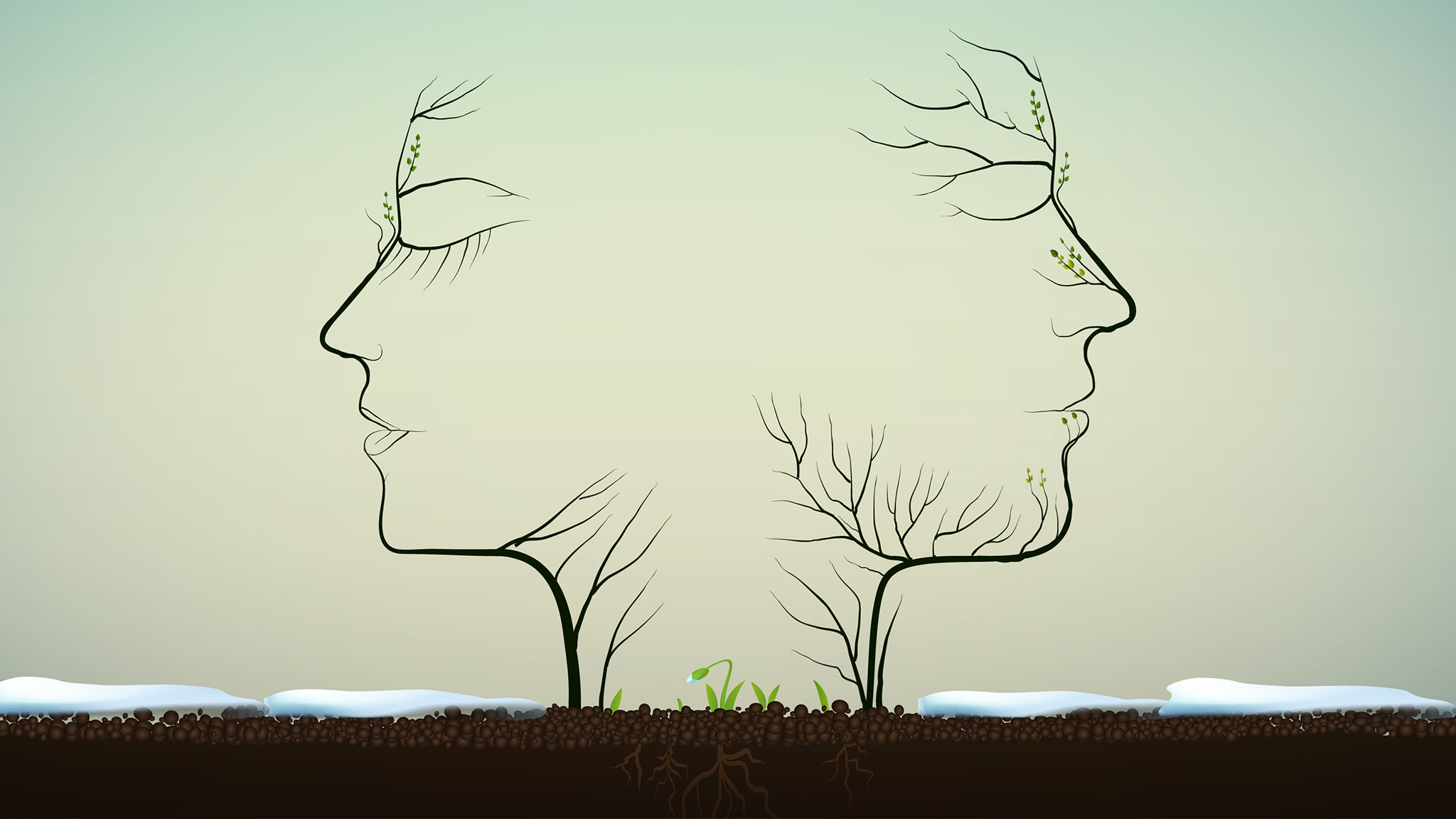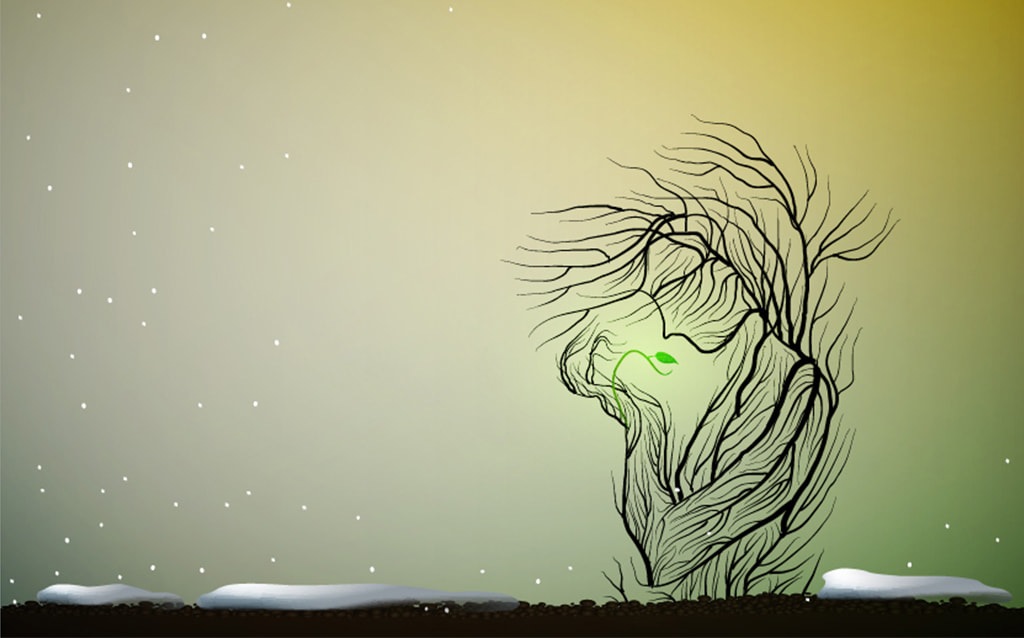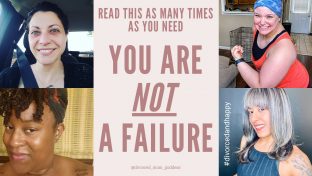Divorce Doesn’t Equal Loneliness: It Can Actually Be Good For You

Divorce does not mean that you’re going to be lonely or alone forever — even if you do experience some feelings of loneliness during or following your divorce.
- Divorce, although often difficult, can be an opportunity to embrace independence, develop talents, improve both mental and physical well-being, and deepen your relationships with others.
- A collaborative, amicable divorce spares both parties a lot of time, money, and emotional trauma.
- Particularly for couples who share children together, an amicable divorce is a good first step towards co-parenting as a successful team.
Struggling with loneliness or having a mental health crisis?
- Suicide Prevention Lifeline: 1-800-273-TALK (8255); Deaf or hard of hearing dial 711 before the number or connect via online chat
Today, I’m gonna talk about the dreaded “D” word:
DIVORCE.
Divorce is something that no newlywed couple ever imagines will happen to them. It’s often seen as a giant failure that should be avoided at all costs.
But here’s the deal — divorce is not a shameful failure or an inherently selfish decision, and it doesn’t have to be a huge tragedy.
The real tragedy would be staying too long in a relationship that’s beyond saving.
It may surprise you to know that divorce can actually be beneficial in many ways.
Beyond serving as a necessary lifeline, divorce can result in better mental and physical health, greater self-esteem, independence, and empowerment.
Rather than destroying a family, divorce can often save it by turning one unhappy home into two much happier ones.
I spoke with a number of divorcees, relationship experts, divorce attorneys, and mediators who helped me to understand the benefits of coming out on the other end of divorce.
I heard candid revelations from those who’ve been through it, discovering how their lives have turned around for the better and what they’ve learned about themselves as individuals and as parents.
Life goes on after divorce, I promise.
Even if you’re just beginning your journey, there is a light at the end of the tunnel — this article will share that light with you.
How Divorce Can Be Good For You

Someday, one of your friends is gonna get divorced, it’s gonna happen, and they’re gonna tell you. Don’t go, ‘ohhhh I’m sorry.’ That’s a stupid thing to say.
First of all, you’re making ’em feel bad for being really happy, which isn’t fair! And second of all: divorce is always good news. I know that sounds weird, but it’s true, because no good marriage has ever ended in divorce. It’s really that simple. — Louis CK
Say what you will about his personal scandals but as a comedian and a dude who’s been divorced, Louis CK makes a pretty interesting point.
Divorce isn’t the end of a good marriage.
It’s the end of a very bad one.
And depending on the circumstances surrounding the divorce, it can bring a great sense of relief when the final paperwork is signed. Breakups can lead to better things in the end.
Louis went on to point out that a real tragedy would be two people who are in a happy, healthy marriage suddenly deciding to get divorced…which has likely never happened.
With that in mind, let’s take a look at some of the ways divorce can be a celebratory occasion or at the very least, not a reason for pity or shame.
Being Divorced And Alone Doesn’t Mean You Have To Be Lonely
My good friend went through a divorce several years ago following a twelve-year marriage.
He came out far better on the other side as a happily co-parenting dad with a great new girlfriend, but he referred to his divorce as being a giant leap of faith at the time.
“A marriage may be miserable but at least that misery is familiar,” he recalled.
Indeed, a big factor that keeps people from pursuing divorce is a fear of experiencing loneliness and the thought of no longer sharing all the day-to-day aspects of life and flying bravely as a solo agent.
This is especially true for those who’ve been married for so long that being with someone else is literally all they know.
Although the fear of being alone is a very real thing, it’s a terrible reason to remain in a marriage that’s on life support.
Life is way too short for that nonsense!
You want the truth? There’s nothing to fear about being alone and there are in fact many plus sides to solitude following separation or divorce.
And you don’t have to worry that you’ll be forced to spend Thanksgiving alone, or that your holidays are doomed to be lonely forever, I promise.
Here are some benefits of being alone after separation or divorce:
- You might feel lonely…or you might feel liberated. Getting away from the pressure and drama of a toxic relationship may lead to a great sense of peace, relief and new hope for the future.
As life coach Dylan King told me:
“I got married straight out of high school and divorced after five years of marriage. I always describe that time in my life as a butterfly coming out of a cocoon. I had no idea how limited I was and how unhappy I was.
My grandmother sent me a card during that time and she wrote in it, ‘Take care. Take time. Before you know it the sun will shine.’ She was right. Now I am remarried with two beautiful daughters, working towards my dream — things my ex-husband would never have supported.”
- Being alone provides the space necessary for self-reflection and healing. It’s too easy to get stuck in the negative cycle of a bad relationship, where you’re never able to get enough distance to gain perspective. Being alone will give you the space needed to analyze, process, and grieve as needed.
- You can redirect all the energy you spent on keeping your bad marriage together. Take the time to rediscover the person you were before you got married. You can pick up an old hobby that you once loved or revisit life goals that you may have abandoned years ago. Perhaps you’d like to pursue a higher degree, start a new business, or take on an altruistic endeavor. Now, you are able to design your own future — the way that you see fit.
- You can finally focus on yourself and put your health first. In fact, making exercise a part of your daily routine is a great idea for a couple of reasons. First, going to the gym is a good way to get out of the house and surround yourself with other people so you feel less lonely (at least during non-pandemic times). Second, exercise helps the grieving process. It releases endorphins, increases blood flow to the brain, and requires a combination of focus and control that is extremely therapeutic.
Society is more accepting of singledom than ever before. Regardless of your age, there’s no shame in your single game!
In fact, singles now make up the majority of American adults at a rate of 50.2%.
Even If You Feel Lonely, Know That You Can Find Happiness Again
So does getting divorced make people happier on average? Research on this has been mixed.
Some studies have concluded that divorced people are no better off than unhappily married couples, the main argument being that marriages change over time and a bad marriage may evolve into a better one if the couple sticks it out.
But other studies have found that divorce does indeed have a positive effect on people’s happiness.
One noted 2005 study by Jonathan Gardner and Andrew Oswald found that divorcees were happier with their lives one year after divorce versus when they were still married.
A recent survey commissioned by Style Magazine found that many of us ladies are in fact happier after divorce than our male counterparts.
During the survey, 1,060 British men and women answered more than 30 questions about their lives and divorces; 53% of women reported that they are “much happier” after splitting with their exes, compared to 32% of men who gave the same response.
Although some folks may struggle with single loneliness, 61% of divorced women stated that they are happy to be single and aren’t looking for new love or a soulmate…sorry, Match.com!
One person who would place herself with the group of “much happier” divorced women is Christine Michel Carter, a brand consultant, advocate, and author who shared her story with me.
Christine had this to say about her former marriage:
“I did what I was taught to do — what I assumed was the right thing to do. I bought a house (albeit at the start of a recession), got married (albeit to a man battling alcohol abuse issues), and had children.
We also had a substantial two-person income (which later wouldn’t matter because we both weren’t fulfilled in our roles). But as it turned out, doing what we were taught to do only made us miserable — my husband was depressed and I suffered from anxiety.”
Eventually, the stress culminated in her waking up with a terrible feeling every night for a week.
“It felt like somebody was punching me in the chest, outside and in the cold,” she observed.
These anxiety attacks were her final warning sign that it was time for divorce.
“I decided to go forward with my divorce because yes, though I feared the unknown of raising children independently, I was still young and knew I had to break free from the cage I’d built,” she explained.
Today, that dark place is in the past where it belongs and Christine has moved on to experience great joy and success as a single working mom.
Christine shared her top advice for finding happiness post-divorce:
- Therapy is a must. She contributes much of her success to therapy, which taught her to feel her emotions, grieve fully and then find the things that bring her joy.
- But don’t dwell on what went wrong. This is the time to focus on yourself and your own healing, which she admits can be hard to do since women tend to put others’ needs before their own.
- Find your passion. Christine used her writing talents to help her through the divorce and it has served as a big part of her career since then. According to her, everyone has a God-given talent — the trick is to tap into it and give yourself new focus.
You May Lose Some Friendships, But Others Will Deepen
Let’s face it: losing friends is an inevitable part of divorce — one that can worsen the feelings of loneliness you may be dealing with.
Married friends might feel strange hanging out with you as a solo agent. Other friends you made while you were married may feel obligated to pick a side between you and your ex-spouse.
And still, other friendships will fall away because, well, a lot of people just plain suck when it comes to acknowledging grief and they don’t know what to do or say.
I spoke with Dara Shlifka, a recently divorced mother of two.
Shortly after her separation, Dara was concerned about how her impending divorce would affect her social circle and create awkwardness for her children and their friends.
She realized that her daughters would probably tell their friends, those friends would tell their parents and Dara would face a barrage of phone calls at the end of that entire “telephone” line of gossip.
Coming up with a fantastic solution, she decided to get in front of it.
She sat down and wrote an email to everyone in her social circle, including her friends and the parents of her children’s friends. In her email, she let everybody know what was going on.
Dara explained that she and her husband were pursuing divorce, but that they intended to remain friends with each other and with everyone in their circle.
She assured everyone that they both wanted to be invited to events and that there was no reason to pick sides.
Dara told me:
“Right after I sent that email, I got a phone call from one of my friends who told me, ‘I’m so glad you sent that email. It was a road map!’…By telling my friends how they could be supportive, it made the divorce much more comfortable.”
When you reach out to others, you might also find that a lot of the people in your circle are going through similar situations.
Christine Michel Carter, the brand consultant I spoke with earlier, was surprised by how many ladies approached her, both in person and through social media.
She was able to connect with both friends and acquaintances who started opening up to her about their own marital problems.
“It’s crazy, the amount of women who come to you and all of a sudden see you as the priest [to whom they can confess],” she explained. “But because you share your honesty, people will want to confide in you.”
It’s also important to remember that during times of loss and grief we find out who our real friends are.
True friends are the ones who will stick by you through the good times and the bad.
You might not have as many friends after your divorce, but the ones you have left will be your cream of the crop, Sex and the City-style girlfriends.
You’ll Reduce Stress-Related Health Risks
We’ve all read the reports that married people enjoy better health and longevity.
The health benefits of being married include the increased chance of surviving cancer, fewer strokes and heart attacks, a stronger immune system, a greater likelihood of surviving major operations, and much more.
However, what’s important to note is that a bad marriage can actually do the opposite for your health.
People who stay in toxic relationships for prolonged periods of time face a variety of health risks.
This includes an increased risk of dying from heart disease, higher blood pressure, higher rates of abdominal obesity, and chronic stress.
On top of this, constant relationship tension can leave a person in fight-or-flight mode with increased adrenaline levels, which in turn leads to fatigue, a weakened immune system, and possible organ damage.
Not only is getting out of a toxic relationship or marriage beneficial to your health, but apparently the good health shows!
Divorce attorney Russell Knight told me:
“I frequently run into my clients after the divorce is long over. Those former clients will look years younger post-divorce than when I first met them before their divorce was finalized or even filed.”
You Can Find Love Again — Or Maybe For The First Time
Following divorce, you’ve lost the security of your old marriage but you’ve also gained the opportunity to find something better.
Maybe you lost the love in your marriage after years or decades of growing apart. Or perhaps the love was never even there in the first place.
Some of us got married for reasons other than love, such as family, social, or religious pressure.
Whatever the reason for your divorce, a new start equals new hope — and it might even mean finding your soulmate or twin flame.
While it’s probably not a good idea to jump straight into a rebound relationship, there’s no reason to think you’ll be single forever if you don’t want to be.
Especially with the advent of dating apps, several of which are designed specifically with divorced folks and single parents in mind.
Of course, this can be rather interesting if the last time you dated was during those old-school, pre-internet dating days.
According to Christine Michel Carter, the brand consultant I spoke with earlier, jumping onto Bumble.com made her feel “just like Encino Man,” bravely yet blindly entering a new era of dating!
The key to finding love after divorce is to make sure you’ve done the necessary work to heal from your marriage and identify any negative old habits so you won’t repeat them.
For example, if your ex was a narcissist, you’ll want to address any codependency issues you may have, which may have attracted you to him in the first place.
It bears repeating: post-divorce therapy is a must!
You may find a fantastic, drama-free partner to spend your days with, or you may even decide to take the plunge and get married again.
Either way, if you do the self-work first, you will open yourself up to finding a new relationship that’s deeper, more fulfilling, and more incredible than you could have ever imagined before.
According to 2013 Pew Research data, remarriage is a bit more common among men than women. Among previously married men, 64% end up remarrying, compared with 52% of previously married women. One possible reason for this disparity, as mentioned above, is that many of us ladies are quite happy being single after divorce.
You May Have A Better Relationship With Your Ex-spouse (Believe It Or Not!)
You might be saying, “Naah, No way, Chrissy. My ex is my ex for a reason.” And that’s fine. Sometimes it’s best to leave the past in the past, especially if you’re divorcing without children…split those assets and move on!
However, many of the divorced moms I spoke with are actually good friends with their exes. And each of them told me in so many words: “It’s not normal, but it works for us!” (As a fellow single mom, I couldn’t help but wonder if it’s more “normal” than we realize!)
Donna Castillo, a San Jose realtor and mom, shared her divorce story with me. She and her ex have always been good friends and they frequently joke with each other that they should have kept it in the “friend zone.”
Problems came, however, after they took their relationship out of the friend zone and decided to get married.
After an initially contentious divorce followed by some struggles over a custody arrangement, they decided to work together and negotiate for the sake of their daughter’s happiness and future.
Donna told me:
“We became friends [again] because we had one major thing in common — our daughter. We both agreed from the beginning that we would raise a strong and healthy girl. Not one raised around anger and fighting. Though it was hard at first, we came back to being the friends we were before we started dating and we are still friends today.”
She went on to share her advice:
“We all get into relationships because we start off as friends. Someone you enjoy spending time with and sharing your life with. If everyone can go back and remember the person they initially fell in love with, it would be so much better for the children of divorces.”
Danielle Thompson, a military veteran and divorced mother of two, is also good friends with her ex-husband and his current wife.
She and her ex had a divorce that was contentious for a while, until they decided to be a “united force” for the sake of their daughter, who was a teenager at the time.
Danielle told me, “We realized we needed to do better in our divorce than we did in our marriage.”
Once they decided to work as a team, their daughter’s mental health improved greatly and she went down a better path.
Danielle has a lot of respect and admiration for her ex-husband.
“I love my daughter’s dad,” she told me. “He fought three wars and brought all his men back with him. He’s jumped out of planes more than 300 times. He’s so persistent…he’s just a crusty old Marine!”
Most Importantly, Divorce Can Be A Literal Lifesaver
Many of us are able to enjoy wonderful friendships with our exes and the fathers of our children (myself included), but for those who are escaping truly toxic or abusive situations, divorce can be a literal lifesaver.
Here’s an interesting fact about the history of divorce: in the past, if two people wanted to get divorced, they both had to consent to the divorce or else one party had to demonstrate to the judge that the other was at fault.
In 1969, then-governor Ronald Reagan passed the no-fault divorce law in California, making it possible for a married person to seek divorce without the consent of his or her spouse.
Many other states followed suit soon after.
So what does all this have to do with domestic violence, you ask?
Economists Betsey Stevenson and Justin Wolfers studied the effects of the no-fault divorce law.
They found that the states which had passed the no-fault divorce law saw a large decline in domestic violence for both men and women.
Additionally, the female suicide rate dropped by about 20% in the long run, and the number of women murdered by their partners fell by 10%.
The no-fault divorce law essentially freed people from being trapped in bad marriages.
(This law, along with progress made by the women’s rights movement, also contributed to a spike in the 1970’s divorce rate that is often erroneously blamed by politicians as the “crumbling of society.”)
Today, all 50 states allow no-fault grounds for divorce.
Divorce drastically changes every aspect of a person’s life.
But sometimes that change isn’t what you expected.
Not to mention the fact that it’s a literal lifesaver for men and women who need to escape abusive situations.
How Divorce Can Be Good For Your Children

Divorce isn’t the end of a family. — Mayim Bialik
How many of us forgo divorce because we worry about the negative effects that it will have on our kids?
We may be ready to pull the plug on an irreparable relationship but when there are kids involved, it gets so much more complicated.
Parents want to look back and say (with as much certainty as possible) that we did the best thing for our children…even if it meant sacrificing our own happiness.
In addition, single-parent households have been stigmatized and viewed as “inferior” by society at large for a very long time.
Not to mention those darn politicians who love to point to our so-called “failed families” as a major cause of various societal ills.
It’s so hard to know if you’re doing the right thing.
If you get divorced, is your home “broken,” as they say? And what does that really mean?
The Myth Of The “Broken Home”
Licensed clinical social worker and child custody specialist Shawn Briley broke this down in a recent blog post that explored the changing dynamics of the modern family and the persistent myth of the broken home.
She pointed out how early research on divorce was flawed.
Among other deficiencies, research often failed to compare the children of divorce to a control group: the children of “intact” families.
She wrote:
“Because we are so accustomed to the notion that parental divorce permanently damages children and leads to all kinds of ‘broken-ness’ — we often fail to view this research with a critical eye.”
She analyzed an article that stated, “Twenty to 25% of teenagers whose parents are divorced are struggling with anxiety, troubled peer relationships, and poor school performance.”
Shawn admitted that while this figure sounds upsetting, the article failed to mention the percentage of teens who are struggling with these very same issues and whose parents are still married.
In fact, a recent Pew Research poll found that 29% of all teens feel stress on a daily basis, and that depression, anxiety, and teenage loneliness are on the rise across the board — cutting across gender, racial, and socio-economic lines.
Shawn went on to point out how the message of the article is affected by the way the statistic is presented:
“…if the author had written: ‘Seventy-five to 80% of teenagers whose parents are divorced do not experience emotional, social, or academic difficulties,’ then the point that the author was trying to make would have been very different. The numbers haven’t changed – just the way they are presented.
This is just one example of how statistics about divorce are often presented in the most negative and discouraging light, thus promoting the stereotype of the ‘broken’ family.”
In fact, there is significant recent research demonstrating that most children from divorced families do not suffer major damage in the long run and that after the initial blow, kids tend to recover well and adjust to their new normal.
Take for example For Better or Worse: Divorce Reconsidered, a book that compiles the research of E. Mavis Hetherington, professor emeritus of the Department of Psychology at The University of Virginia.
After three decades of research involving 1,400 families, professor Hetherington found that two years after their parents’ divorce, most children began to function reasonably well again.
He also found that while children in divorced families are more likely to have problems compared to those in non-divorced families, the vast majority had adjusted well after six years.
Those of us who don’t have a nuclear family are actually in the majority now! According to recent Pew Research, fewer than half (46%) of U.S. kids are living in a home with two married heterosexual parents in their first marriage.
The Great Big Book of Families is a fantastic children’s book that illustrates all the different types of families — it’s one of my own child’s favorite books.
Two Happy Homes Are Better Than One Miserable Home
It’s definitely encouraging to know that children aren’t necessarily damaged as a result of divorce.
But what about all those couples who decide to stick it out and stay together for the sake of the kids? Isn’t this still the better option?
Not necessarily.
Of course, it’s always fantastic when a couple can work through their issues and keep the family together in the end.
But when they aren’t able to do this effectively and there’s a long-simmering animosity — or even outright hatred — this can cause some serious damage to the children who witness it.
According to The Roots Of Loneliness Project’s staff psychologist, Dr. Christie Hartman:
“Divorce hurts, but it’s what caused the divorce that does the damage more than the divorce itself. Kids are adaptable [and] seeing Mom or Dad unhappy in a bad marriage over the long haul is, in my opinion, more damaging than the pain and suffering of divorce, which is temporary.”
Grace Lee, single mom and founder of A Good First Date LLC, considered the following when going through her divorce:
“For kids, seeing two people you love fight is the most terrifying thing in the world…kids want their parents to be happy because it makes them feel safe. They don’t want to worry on behalf of their caregivers. Let’s face it, growing up is stressful enough.”
Another interview subject, a mother of an only child and who wished to remain anonymous, told me quite simply:
“I didn’t want my daughter to learn that relationships were as toxic as my marriage. As painful as my divorce was, I didn’t want my child to be around that toxicity.”
In contrast to “sticking it out for the kids,” divorce may bring a great sense of relief to children — specifically, the relief from living in a tense home with two parents who are no longer in love with each other.
And even if they don’t understand all the “why’s” at first, things will become more clear as they get older.
I spoke with Sandy W., the grown child of two parents who divorced when she was three years old. As she put it:
“My dad was involved in some bad things when I was younger, and my mom’s divorce from him may have kept me from going down the same path. My mom ended up in a relationship with my stepdad who was a much more suitable and stable role model growing up.
Now that my dad is on the straight and narrow, we have a great relationship as adults. I didn’t get it at the time, but I do now.”
It Comes Down To Us Parents
The divorced mother of two I spoke with earlier, Dara Shlifka, pointed out that it really all comes down to us as parents: the level of success that our children have in adapting is dependent upon the support we give to them and the attitudes that we demonstrate.
Happy parents = happy kids, regardless of whether they’re all living under the same roof.
Dara shared four things that have worked for her own family:
- A united front. She always backs her ex-husband up if the kids try to work her against him. (How many of our kids do this? “…Mom! Dad is sooo unfair!”)
- Money, as it pertains to the divorce, is never discussed in front of the children.
- Kids always come first. As Dara stated, sitting down with your ex-spouse and deciding to put the kids first is the most important thing you can do to help them thrive. She worked hard with her ex-husband to make sure their kids kept a sense of normalcy — that their friends were still their friends, that they weren’t pulled out of school, that their activities stayed the same and their schedules were not disrupted. She and her ex also set up a “home base” during the school year: weekdays with mom and weekends with dad. This way her kids weren’t, as she put it, “dragging suitcases and leaving homework behind.”
- They still do things together as a family. Dara told me: “My kids have access to both of their parents when they want it. If our kids want us both there, then we are there [and] we try to be together as a foursome as much as possible.”
She went on to point out that she is very lucky in this respect, acknowledging friends of hers whose ex-spouses are not as amicable.
A nuclear family isn’t superior to yours simply because it has a more “traditional” structure.
As my own mom used to tell me: “You never know what goes on behind closed doors!”
In other words, just because that “perfect” family down the block seems to have it all together, doesn’t mean they really do.
Your kids may split their time between two houses but with your support, they can be just as happy and well-adjusted as their friends whose parents are married.
How To Have An Amicable Divorce…It Doesn’t Have to Be The War of the Roses!

I wanted to turn my divorce into a positive. What if I didn’t blame the other person for anything, and held myself 100 percent accountable? What if I checked my own sh*t at the door and put my children first? And reminded myself about the things about my ex-husband that I love, and fostered the friendship? — Gwyneth Paltrow
As many of us remember, Gwyneth Paltrow was mercilessly teased and put through the media wringer when she introduced the idea of “conscious uncoupling” to us in 2014.
But you know what? As completely hokey as it seemed at the time, Gwyneth was onto something!
The idea that divorces have to be ugly, drawn-out battles is a societal myth that’s worth dispelling. Did you know that 90% of divorces are settled before they even go to trial?!
The truth is you can have a divorce that’s respectful and dignified.
One way to divorce with dignity is for you and your spouse to agree to have an amicable divorce.
There are some big benefits to having an amicable divorce:
- It will save you a lot of time and money in legal fees
- It will prevent your relationship with your ex from spiraling into a crazy “War of the Roses” scenario
- It is your best chance for maintaining a civil relationship down the line. This is especially important if you and your ex share children with each other
Grace Lee, the single mom and founder of A Good First Date LLC I spoke with earlier, shared the following advice for heading into divorce where children are concerned:
“Your kids won’t remember how many weeks they spent with you, whether it was 40/60 or 30/70, but they will remember the arguments and the court dates.
Kids are incredibly intuitive and even if you manage to keep your mouth shut, they will feel the animosity…If you want your kids to succeed, then make a concerted effort to keep their feelings first.
The custody details that people fight about don’t make that much of a difference in the long run, but the fighting does.”
Doing It Your Way: Amicable Divorce Options
It’s important to keep in mind that there are different types of divorce that you can pursue, each with its own set of pros and cons. Here’s a quick breakdown:
- The “DIY” Divorce — filing paperwork with either limited or no lawyer involvement:
Many people don’t realize that this is even an option, but it is! Danielle Thompson, the military veteran and divorced mother of two I spoke with earlier, decided to go this route with her ex-husband.
As she told me, it took them six months to finalize and $1500 total (as compared to $75 for their initial marriage license. Crazy!)
Danielle said:
“I can’t imagine how much more money it would have cost if we were arguing!”
Danielle and her ex preferred to keep the state out of it “as much as possible” and as far as child support and alimony were concerned, they came up with what she refers to as a silent handshake.
They did, however, hire an attorney just to be sure the paperwork was correct and she recommends that other DIY divorcers do the same for peace of mind.
- Mediation:
Another option to consider is using mediation to come to an agreement on your divorce terms.
A mediator is not a lawyer or a judge but they help couples collaborate to reach agreements on issues such as division of property, child support, visitation, etc.
Because there’s no court involvement with mediation, it’s a more relaxed environment that encourages a peaceful resolution. There’s also usually no lawyer involvement, or if a lawyer is involved, it’s on a consultation basis.
This is a significantly less expensive option than litigation, with the reduced cost further decreasing anxiety and tension between the parties.
- Litigation:
Litigation is your “non-amicable” option for divorce.
Litigation requires lawyers on both sides, and sometimes additional experts such as forensic accountants, custody evaluators, real estate appraisers, and more.
This is the divorce option that gets pricey and adversarial.
Both sides will be inherently taking oppositional positions on most (if not all) of the matters at stake because, well, you’ve got two lawyers fighting against each other.
Ji Park, Founder and Managing Attorney of Park Family Law in Beverly Hills, illustrated this issue by sharing a curious case of his that involved a set of candlesticks:
“In one of my cases, the couple fought for months over who would get two candlesticks. The amount of attorney’s fees incurred to litigate who should get the candlesticks ended up costing the couple thousands of dollars — much more than what the candlesticks were worth. Sometimes, people get so emotionally invested in fighting that there is no way to talk sense into them about the money they are wasting.”
For that reason, he often recommends that his clients pursue mediation over litigation whenever possible.
Sometimes, however, litigation is unavoidable. As divorce attorney Russell Knight told me:
“If one of the parties won’t listen to reason in advance of or at mediation, then you simply must take the matter to the judge. The whole point of the judge is to resolve matters if you cannot resolve them amongst yourselves.
The risk, however, is that a judge may not decide the matter in a way that is preferable or acceptable to either party. Going to court does not have to be a “nuclear option” though. The lawyers can stipulate to all agreed facts and present the matter to a judge with little or no argument.”
Divorces don’t have to be big ugly battles fought out in front of the judge, and most of the time they aren’t.
Closing Thoughts
Sara Long, a remarried mother of two, had this final piece of advice to offer to anyone who’s going through separation or divorce:
“On your road through life, don’t look at your divorce as a failure, but as a stepping stone towards where you needed to be, or a mountain you needed to climb.”
There’s no doubt that divorce is a difficult process for anyone who’s going through it. It’s a great loss, and there’s a lot of grief involved.
But there’s also a lot of hope.
After all, divorce is an ending to one chapter of life but a new beginning to another.
What we do with that next chapter is entirely up to us.
Editor’s Note: This article is part of The Roots Of Loneliness Project, the first-of-its-kind resource that comprehensively explores the phenomenon of loneliness and over 100 types we might experience during our lives.
Find Help Now
If you’re struggling with divorce loneliness, we’ve put together resources to meet you wherever you are — whether you want someone to talk to right now, or are looking for longer-term ways to help ease your loneliness.
- Suicide Prevention Lifeline: 1-800-273-TALK (8255); Deaf or hard of hearing dial 711 before the number or connect via online chat
- Resources & Emotional Support For Loneliness
- Volunteer & Pet Adoption Opportunities






